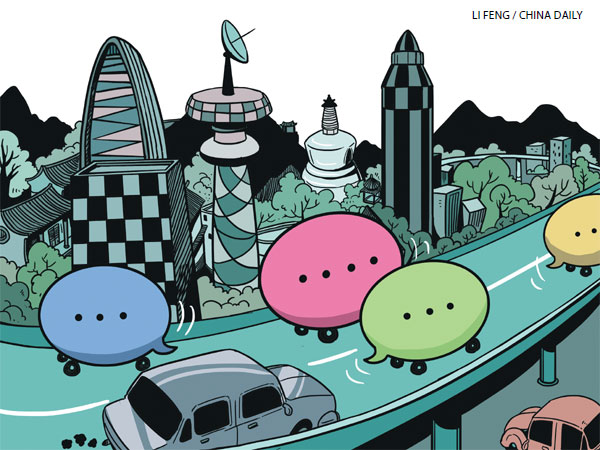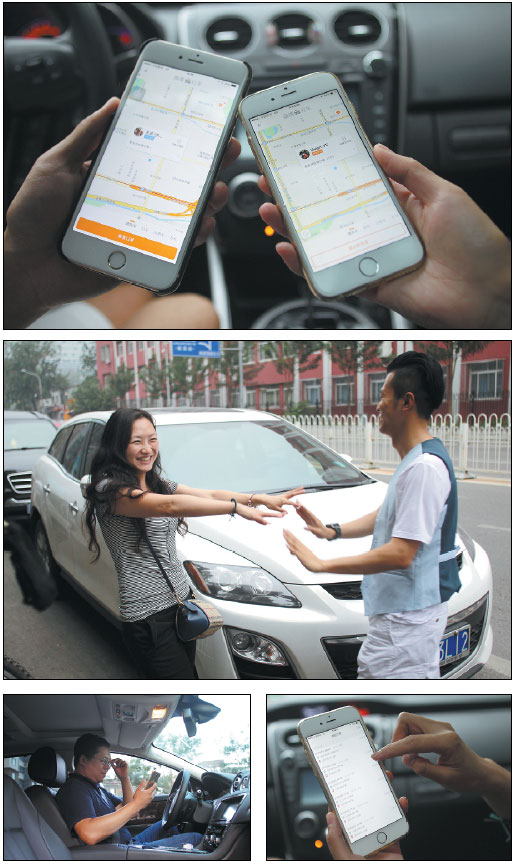Civility strikes back

The Internet, apps and the many other technological trappings of 21st century life are doing nothing but turn us all into selfish, asocial automatons. Right? Wrong
It used to be one of Ma Tianyi's best and most reliable friends. No matter what his mood was, in sunshine, hail, rain or snow, waiting for him each day as he prepared to journey to and from work was his car radio.
Even if the conversation was all one way, it relieved the monotony of the 38-year-old's one-hour commute to and from the office and was a good distraction on days when Beijing's bumper-to-bumper traffic could try the patience of a saint.

But these days Ma's radio has taken a back seat, ousted by 21st century technology that has spawned a whole new set of friends for him, and with these friends the conversation is no longer one-way traffic.
The technology is none other than the ubiquitous app, in this case Dida Pinche, which allows people to car pool.
"This is a new lifestyle," says Ma, who owns an Internet startup company in Beijing.
"It's a good social circle through which we can meet many people and make friends."
Like him, more private car owners and passengers are now using carpooling apps, drawn not only by how much money it saves them and the feel-good factor of doing something for the environment but also by the apps' role as a social adhesive at a time when it often seems the technology of the selfie generation is driving us apart.
There are several popular carpooling apps in China. The app Dida Pinche, whose proprietor's headquarters are in Beijing, has more than 1.5 million registered car owners and 16 million users. It covers more than 40 cities, and its proprietors say it serves more than 1.2 million a day.
Zhu Xiaojia, 37, says she now rarely drives her car on workdays since she started to use such apps to commute to and from work more than three months ago. Parking in Beijing's Central Business District can be hard to find and expensive, she says, but there is much more to her decision to use the apps than economics.
"It really is tiring driving during rush hours," says Zhu, a course consultant at EF Education First International Language Centers in Beijing, who spends two hours on the road each day getting to and from work.
"Carpooling allows me to talk with different people. Instead of driving on the weekends I will also carpool to do my bit for the environment."
Another benefit in carpooling is that it takes cars off the road and can help ease traffic congestion, she says.
Zhu says she usually sits next to the driver, and they chat like friends. She enjoys talking with people from different industries and gets to know about the fields they work in, she says.
Once when she was chatting with a car owner she discovered they had a mutual acquaintance each of them had gotten to know through car pooling. Such coincidences are not that uncommon among carpooling app users, even if some attribute it to yuan, a Chinese word that refers to people being drawn together by destiny.
"It's like the six degrees of separation theory, which says a friend of a friend can connect any two people in a maximum of six steps," Zhu says.
A decade ago, Shao Fang, 30, worked in Xi'an, Shaanxi province, and traveled to Beijing on a business trip with her boss and made a friend. Last month she discovered that the owner of the carpool vehicle in which she was a passenger was a workmate of the friend.
"It was amazing to meet a complete stranger who happened to know my friend," says Shao, who works in marketing in Beijing. "Along the way we talked about the various ways my friend had changed over the years."
It is often said that as modernization has swept over China, its citizens are not as close to their neighbors as they once were, but these apps seem to be reversing that trend.
Zhu says her circle of friends has become bigger, including more than a dozen neighbors who work in office buildings close by, and they often get together on weekends, setting up the meetings through the social networking app WeChat.
Ma says he knocked into a young man who lives in the same community as him twice - once when he was the driver, and the other time when he was the passenger. They have a lot in common, and have become friends, playing badminton together on weekends, he says.
"During rush hours the subway is overcrowded, and carpooling is an affordable and convenient way of getting to and from work, especially for youngsters. Some of my young single employees are even looking it as a new way of finding a boyfriend or girlfriend."
For those who use the carpooling apps, the usual conversation ice-breaker will relate to what kind of work each of the parties does, so some apps have broadened to become a platform for talking about careers and even job opportunities and offers.
Zhu, a consultant for overseas study tour programs for adults, says such programs are relatively new in China, and some of the car owners who have driven her have shown a keen interest in the topic.
"This is not set up. Random chats just occur. People are interested in what you do and you simply talk about it with them. I once met this guy who had opened a cafe, and he told me all kinds of things about coffee."
Zheng Yi, 27, executive director of an Internet company in Shanghai, says that often when he is carpooling he bumps into people from his industry because his company is located in an area where many startup companies are located. They have learned a lot from one another during such encounters, he says.
"It's possible to dig around by using carpooling or car-hailing apps. The first passenger I met told me he was looking for new opportunities and came to our company for a chat later."
Some of Zheng's colleagues distribute brochures of their products when they use such apps.
"It's much better than dishing out fliers randomly on the street because some drivers are our target customers, those interested in starting their own business."
Duan Yan, 32, an office worker from Beijing, says she has carpooled with others more than 120 times. She sits in front of a computer all day, she says, and carpooling has become an important tool that helps her socialize.
"It's an environment in which people can chat, and most are willing to talk. I get to pick up a bit of basic knowledge and inside secrets on the fields they work in, and some proffer career advice."
She even bought insurance from one driver, she says.
"Thanks to such apps, I don't have to push myself to learn how to drive or buy a car."
Shao Fang says carpooling helps her build trust with strangers, and she has become more willing to step in to help anyone in need.
"I've carpooled in expensive cars such as Mercedes, BMWs and Land Rovers," says Shao, who adds that she has used carpooling apps 80 times in the past six months. "The car owners are very nice.
"There are always these little heart-touching surprises. These days people are busy and often have no time for others. It's good to have these apps that change our lives just a bit."
Since she began carpooling she has undergone many changes, she says. Many of these may be imperceptible, but she feels she now has a brighter personality and is more apt to talk with others.
Car owners and passengers can comment and leave their first impression of each other on profiles visible to users. As with social media, they can include details such as age, occupations and hobbies.
"Most of our car owners are middle-class and aged from 25 to 45," says Li Jinlong, cofounder and marketing vice-president of Dida Pinche. "We want to make it more pleasant to go out and bring strangers closer. We offer bonuses to car owners based on these comments, to encourage people to communicate more in cars."
Duan says: "I feel that what they offer is a real person, rather than a service. It's nice reading some of the comments people leave. One comment I saw consisted of an ancient poem. I put a lot of effort into writing my comments because I realize those who read them will draw the same kind of satisfaction as I do from such feedback."
Zhu Di, an associate professor at the Institute of Sociology, Chinese Academy of Social Sciences, says car pooling apps are presenting a new way for people in big cities to make friends and expand their social circles.
Chinese are more reticent than Westerners to talk with strangers, she says, and sitting in a car provides an ideal venue for chatting, she says.
"The ways we interact socially are changing and they can be broadened. Social intercourse traditionally refers to acquaintances sitting together and chatting. But in a busy world doing that takes a lot of time.
"In big cities, young peoples' social circles tend to be limited, and for Chinese it takes time to become acquainted with others and form friendships. But every instance of social interaction does not necessarily have to lead to a friendship being formed."
xulin@chinadaily.com.cn
| Top: One of China's most popular carpooling apps Dida Pinche; middle: a car owner (right) and a passenger have become good friends; above left: a car owner using an app in his Jaguar; above right: an itinerary log of on an app. Photos by Zou Hong / China Daily |

(China Daily European Weekly 08/07/2015 page24)
Today's Top News
- Japan tempting fate if it interferes in the situation of Taiwan Strait
- Stable trade ties benefit China, US
- Experts advocate increasing scope of BRI to include soft power sectors
- New engine powers cargo drone expansion
- China to boost green industry cooperation
- Manufacturing PMI rises in November































